"I'm in pain! Let the government hear that!" cried out Wang Pei-hsin (
Wang's pain, which echoes that of many other blind massage professionals, is caused in part by the slack business resulting from the public's misunderstanding of the massage industry and ongoing discrimination against the blind.
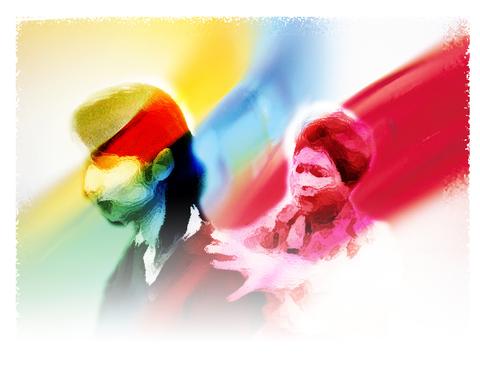
The center, on the fifth floor of an apartment building, is easy to miss as it has no sign marking it outside. Those who have found the place were largely taken there by friends who recommended the service. Its three rooms, which can accommodate a total of six costumers, are equipped with basic facilities such as restrooms and air-conditioning and are kept reasonably clean.
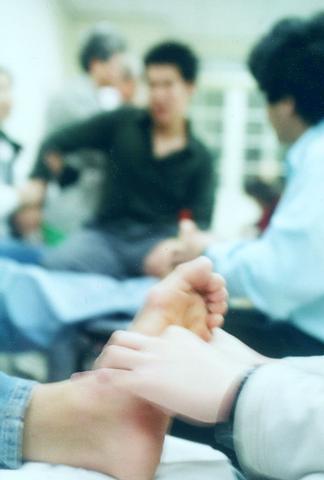
PHOTO: DAVID VAN DER VEEN, TAIPEI TIMES
Most masseurs, however, can afford no better than dark and poorly-ventilated flats, despite the fact that a shoddy and suspicious-looking exterior may scare off potential costumers -- something of which they are all too aware.
Although the Physically or Mentally Handicapped Protection Law of 1985 says that only visually impaired people can practice massage, masseurs who are not visually impaired take up most of the market. Witness the ubiquitous barber shops with darkened windows which employ masseuses who provide sexual services as well.
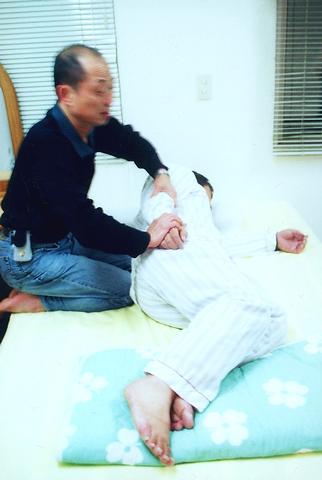
PHOTO: DAVID VAN DER VEEN, TAIPEI TIMES
"When the police were regulating the eight major businesses (
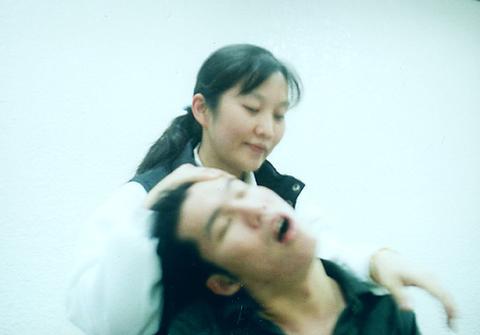
PHOTO: DAVID VAN DER VEEN, TAIPEI TIMES
"What [the police] forgot to add is that they meant brothels operating disguised as barber shops. That resulted in a serious misunderstanding among the public that blind masseurs are indecent people."
Wang's massage center was opened three years ago amid severe stereotyping. With quiet perseverance, Wang and his co-workers open their doors daily, but may only receive three or four customers a day, even on holidays.
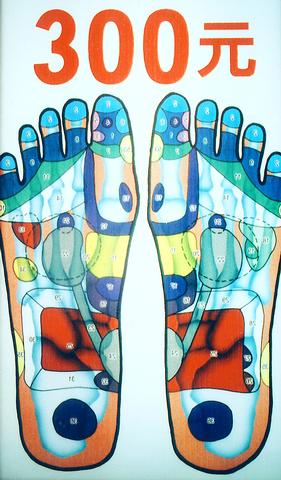
PHOTO: DAVID VAN DER VEEN, TAIPEI TIMES
When they started the center, they cheerfully put up a signboard on the apartment building, but the next day, a woman living in the same building demanded they take it down.
"`People would think that there's a sex business in this building,'" Wang quoted the woman as saying. "To avoid quarreling with our new neighbors, we took down the signboard, though our business has nothing to do with the sex industry." Wang said that following the incident they never tried to put up signboards or place advertisements, afraid of being mistaken again for a place of ill-repute. But the lack of promotion is not helping business.
Government help
Not that the government doesn't know or doesn't care about their difficulties. The Taipei City government provides an annual NT$2 million subsidy for the mentally or physically impaired. A notice saying that his business receives such a subsidy is painted right at the entrance of Wang's establishment.
The government is not giving away money for nothing, however, and in the case of most massage centers it may be asking too much.
A massage center whose earnings are under a certain level must train a certain number of non-congenitally blind people to perform massage and help them pass the examination for a class-C massage practitioner's certificate, a process that takes two years.
This is no easy exam. In addition to the seven applied massage techniques, the examination includes anatomy, physiology, pathology, knowledge of the body's circulation systems and so on. The same comprehensive training would take up to five years in China and three years in Japan.
The qualification greatly reduces the benefits of the subsidy insofar as enrolling students is very difficult. Most non-congenitally blind people, in Wang's experience, would rather be unemployed than work in such a rigorous profession.
"In the end we resorted to scholarships taken out of our own pockets. By doing so, the subsidies we got only balanced what we spent on the training program. It's no subsidy at all!" Wang said.
Another expression of goodwill that failed to benefit the blind was Taipei City Government's Bureau of Social Affairs' plan two years ago to set up massage parlors in hospitals. Aimed at creating business opportunities for the blind, the plan called for spaces on the ground floor of hospitals. The plan, however, fell flat.
"What they did was give us a two-ping space," Wang said. "The bureau failed to consider how we would commute to and from the hospital. Taking taxi fares into account, it wasn't worthwhile. Later we found out that the space was rented to us. ... What's the point of going all the way there only to lose money?"
Lost heyday
The golden age of massage was the 1970s, when the Peitou hot springs were home to a brisk sex industry. The area around Peitou Park was full of clubs, restaurants and hot spring hotels catering to the Japanese, whose belief in the springs' therapeutic effects had earlier led them to develop the area during the colonial era.
Along with Japanese businessmen, politicians and the local nouveau-riche came geishas and musical acts, or nakashis, earning Peitou the name "land of the tender" for its burgeoning entertainment district. Numerous business deals were done while soaking in the hot springs, or in the live-band karaoke bars and brothels.
During the boom, the average blind masseur easily made enough money to buy a decent house downtown within two years by serving not just the tourists but often the prostitutes who accompanied them. The huge profits fueled cut-throat competition, discouraging many masseurs from entering the Peitou scene.
It was in 1979, when the Taipei City Government tore down the sex-trade district in Peitou, that the massage industry went downhill. Only half of the hot spring hotels survived without the sex trade.
The 1970s also saw the spread of barber shops where young girls provided sexual services under the guise of massage. Over time these were largely replaced by saunas that also disguised sex services as massage. These operations now employ some 120,000 people, in sharp contrast to the scant 4,000 blind certified massage therapists.
Having been mistakenly associated with sexual services for a long time, massage therapy is in need of a new image.
Yang Fu-hao (
Yang's strategy has worked wonders. He opened a second parlor three months later, and a third in July of this year. The fourth is scheduled to open next month. The three current branches receive 300 to 400 costumers on an average holiday and at least 100 on weekdays.
"It's all about marketing," said Yang, who was a board director of the Taipei City Massage Professional Association during the Peitou hot spring scene of the 1970s. Like most visually-impaired people, he had been trained as a masseur, a profession which, Yang's teachers had told him, is the first and last job for the blind. However, his curiosity would not keep him confined to the field of massage. Attending various business workshops, the self-taught entrepreneur later ran businesses ranging from a record studio, to an insurance agency, all the while maintaining his skills as a masseur.
"No matter what the business, you need to make changes in order to improve. When I wanted to set up my massage centers, I was thinking about what changes we had to make to reclaim the market long taken over by barbershops. Blind masseurs' businesses need a distinguishably healthy image. ... By showing what masseurs do in bright light, we try to give the public the correct idea of massage," he said.
Level playing field
But entrepreneurship is not the only answer for the visually impaired who want to pursue a career in massage. For coming generations, elevating the level of massage as a profession may, in turn, elevate its image in the public eye.
"Massage not only helps the body relax, but has therapeutic effects. We hope that rehabilitation departments in medical schools can soon begin to enroll visually impaired students, to raise their status from that of massage practitioner to medical professional," said Cheng Zi (
"What the visually impaired really need is a deep understanding of their situation," Cheng said.
As much as the motherly dean cares about her students, she cannot look after them forever. In her opinion, greater understanding and action on the part of the government will give the visually impaired more choices in their lives.

On April 26, The Lancet published a letter from two doctors at Taichung-based China Medical University Hospital (CMUH) warning that “Taiwan’s Health Care System is on the Brink of Collapse.” The authors said that “Years of policy inaction and mismanagement of resources have led to the National Health Insurance system operating under unsustainable conditions.” The pushback was immediate. Errors in the paper were quickly identified and publicized, to discredit the authors (the hospital apologized). CNA reported that CMUH said the letter described Taiwan in 2021 as having 62 nurses per 10,000 people, when the correct number was 78 nurses per 10,000

As we live longer, our risk of cognitive impairment is increasing. How can we delay the onset of symptoms? Do we have to give up every indulgence or can small changes make a difference? We asked neurologists for tips on how to keep our brains healthy for life. TAKE CARE OF YOUR HEALTH “All of the sensible things that apply to bodily health apply to brain health,” says Suzanne O’Sullivan, a consultant in neurology at the National Hospital for Neurology and Neurosurgery in London, and the author of The Age of Diagnosis. “When you’re 20, you can get away with absolute

When the South Vietnamese capital of Saigon fell to the North Vietnamese forces 50 years ago this week, it prompted a mass exodus of some 2 million people — hundreds of thousands fleeing perilously on small boats across open water to escape the communist regime. Many ultimately settled in Southern California’s Orange County in an area now known as “Little Saigon,” not far from Marine Corps Base Camp Pendleton, where the first refugees were airlifted upon reaching the US. The diaspora now also has significant populations in Virginia, Texas and Washington state, as well as in countries including France and Australia.

May 5 to May 11 What started out as friction between Taiwanese students at Taichung First High School and a Japanese head cook escalated dramatically over the first two weeks of May 1927. It began on April 30 when the cook’s wife knew that lotus starch used in that night’s dinner had rat feces in it, but failed to inform staff until the meal was already prepared. The students believed that her silence was intentional, and filed a complaint. The school’s Japanese administrators sided with the cook’s family, dismissing the students as troublemakers and clamping down on their freedoms — with